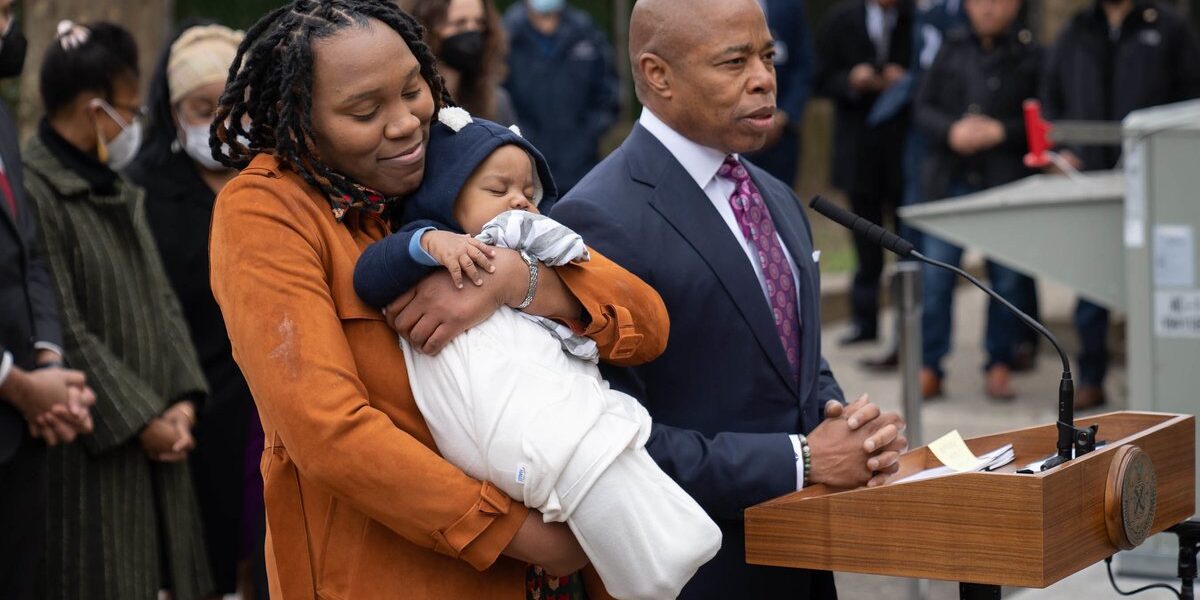A small but growing share of New Yorkers are receiving help from doulas during pregnancy and childbirth, but racial and geographic disparities persist among those using the services, according to a new report from the city health department.
While most participants in a city-funded program known as the Citywide Doula Initiative identify as Black, overall access to doulas is still far higher among white New Yorkers than other racial groups, found the report, which was quietly released late last month.
Nearly two-thirds of New Yorkers receiving doula support during pregnancy in 2023 were white, even though white New Yorkers only accounted for about a third of births citywide. About 16% of New Yorkers receiving doula care last year were Black, 12% were Hispanic and 6% were Asian, according to the health department.
The analysis of doula services comes as Mayor Eric Adams continues to work to improve maternal health outcomes. Adams campaigned on a platform to close the maternal health gap in New York City, where Black women are much more likely to die in childbirth than white women.
In 2022, the mayor signed legislation to scale up the Citywide Doula Initiative, which trains doulas and pays them to work with low-income New Yorkers in a set of neighborhoods that the city deemed as having poor health outcomes. The program has served more than 2,000 families since March 2022 and is being extended indefinitely, even though city law only required it to operate through June of this year, said city health department spokesperson Shari Logan.
While doulas aren’t clinicians, they’re trained to work one-on-one with people during pregnancy or the birthing process to provide information as well as physical and emotional support.
Studies show doulas can help reduce the rate of cesarean sections and premature births while easing their clients’ stress and anxiety.
Doulas are becoming a key piece of both city and state strategies to improve maternal health outcomes, particularly among Black New Yorkers. An audit on maternal health released by the state comptroller on Tuesday found that progress on reducing maternal health disparities across New York has stalled, as Black New Yorkers continue to die from pregnancy-related causes at more than four times the rate of white New Yorkers.
But making doula access both equitable and widespread remains elusive even with targeted outreach, according to the city health department’s report. It found that in addition to racial disparities, access to doula services also varies widely between boroughs and neighborhoods.
Overall, only about 5.5% of New Yorkers who gave birth in 2023 had the support of a doula during their pregnancy, up from nearly 4.7% the previous year, per the report. But the rate was much higher in Brooklyn (9.5%) and Manhattan (6.8%) than in other boroughs.
Between 2022 and 2023, the rate of doula uptake increased in every borough except Staten Island, where usage fell from 2% in 2022 to 1.7% in 2023.
“I think it’s a good start,” said City Councilmember Jennifer Gutierrez, who sponsored the legislation on the Citywide Doula Initiative. “These are kind of benchmark numbers that are important for us to assess.”
There is some evidence that doulas are incrementally helping to improve pregnancy outcomes. Rates of cesarean sections and preterm births appear to be slightly lower among participants in the city’s doula program than in the five boroughs overall, although rates of babies born with low birth weights appear to be slightly higher in the program, according to the report.
The city compared outcomes from the doula program in 2023 with citywide rates from 2021 because that was the latest year for which citywide data was available.
Gutierrez said she hopes the city further ramps up its training efforts for doulas and does outreach to educate people about the existence of doula services. She said that when she was pregnant, she had the help of her sister-in-law — a trained doula and midwife — but noted that if it weren’t for her, she might not have known about the option of having a doula.
“It was not something that I myself even knew how to research,” Gutierrez said.
Slow payments from the city’s health department have been one of the biggest challenges for doulas participating in the Citywide Doula Initiative so far, the news outlet The City has reported. But a new state law that took effect in March is likely to provide a more reliable funding stream while further expanding doula access.
The state now requires doula services to be covered under Medicaid, the public health insurance program for people with low incomes. As of July 31, 103 doulas had registered to accept Medicaid statewide, according to the state health department. They are listed in an online directory.
There could still be gaps in access to doulas for people who earn too much to qualify for Medicaid but not enough to afford the services on their own, according to the city health department report. City health officials are looking into how prevalent coverage for doulas is among commercial insurers, it said.
The city’s health department said it’s also aiming to improve the effectiveness of doula services by creating “doula-friendly” hospitals. As it stands, there are varying attitudes toward doulas within hospitals and in some cases, hospital policies are used to limit doulas’ access to their clients’ delivery rooms during childbirth.





